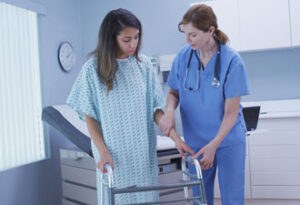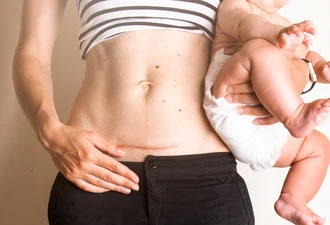
Cesarean operations are common today and recommended as the safest option to avoid any health concerns related to you and your child during childbirth. Here’s all you need to know about Cesarean post-operative care, the time you are supposed to spend in the hospital including precautions to take, how to manage pain and including when can you go home.
POSTNATAL CARE AFTER CESAREAN DELIVERY
Care after C-section delivery begins with mother and baby being moved from the operation table to a smaller ward for observing their condition often called as the recovery room. After a few hours, you will be moved to the postnatal ward with your baby. It is here where regular checks will be undertaken to see if the anaesthesia is wearing off along with other regular checks for blood pressure, breathing, wound relief for the first few hours by a nurse. Your vaginal bleeding will also be monitored to ensure that your maternal pads are replaced in a timely manner. A catheter to drain urine from your bladder is likely to be removed after 12 hours of your operation. You will be made to wear compression stockings to reduce any risk of blood clots. In the postnatal ward, you will be on a drip until you feel ready for taking food and drinks.
AFTER CESAREAN OPERATION CARE
THINGS TO KEEP IN MIND WHILE RECOVERING
You are likely to feel wobbly and unsteady while you make an attempt to stand up and go for a walk to the bathroom especially with the catheter on. Let your nurse help you the first time around with such activities. Also, your abdomen area may feel heavy, consult your nurse so that she can give you some medicine beforehand.
You will be advised to drink plenty of fluids after removal of the catheter and your nurse may measure the amount of urine you are passing to check if there no problems with your urinary bladder. If you have any problem while passing urine you should tell your midwife about it.
The pain post cesarean operation will continue to persist and in certain cases may be for a week. For pain alleviation, you will be having painkillers. Make sure the dose of the painkiller is strictly monitored by the nurse as certain painkillers may be harmful to your baby as you would be breastfeeding.
It’s important to have some mobility after your C-section operation to reduce blood clots. At the same time, you should drink plenty of fluids and will be given a daily injection for blood thinning by your nurse.
When you get out of bed to have a shower you may feel a strong sensation of pain in your abdomen. Keeping your hand pressed against it will give you some relief.
For dressing of the wound, it should always be done by a nurse or under your nurse’s care and supervision. The first time the wound would be dressed will be after 24 hours of cesarean delivery. Don’t worry if your wound gets wet as it is waterproof. Your wound would be closed either by clips or stitches and it should only be removed in case of cesarean care only by a trained midwife after a week or so by visiting your home.
Vaginal bleeding post-cesarean delivery is normal and you should not panic. It would continue for two to six weeks after childbirth. The reason behind it is that the separation of the placenta from the womb.
Drinking prune juice, peppermint tea can help you improve your bowel movement post cesarean delivery.
Cesarean post-operative care ensures the best ways for you to bond with your baby with a midwife teaching you the right way to breastfeed and ensure that you and your baby has maximum skin contact.
If you and your baby are well, you will be released from the hospital between two to four days. In case you or your baby have any added complications then your stay could extend for a while. A mother is released after C-section delivery only when her mind is peaceful and at rest after an operation.
As an extension of postoperative care from the premises of the hospital to your home, health visitors, or midwife will visit your home at regular intervals to help you with medicines, health monitoring and even some time to put you in touch with other parents and local support groups.
We would recommend you to have trust on your midwife and follow her instructions as dutifully as possible and do not be afraid of a C-section surgery as with high standard cesarean post-operative care, the entire procedure will pass on smoothly and would be over in no time.




